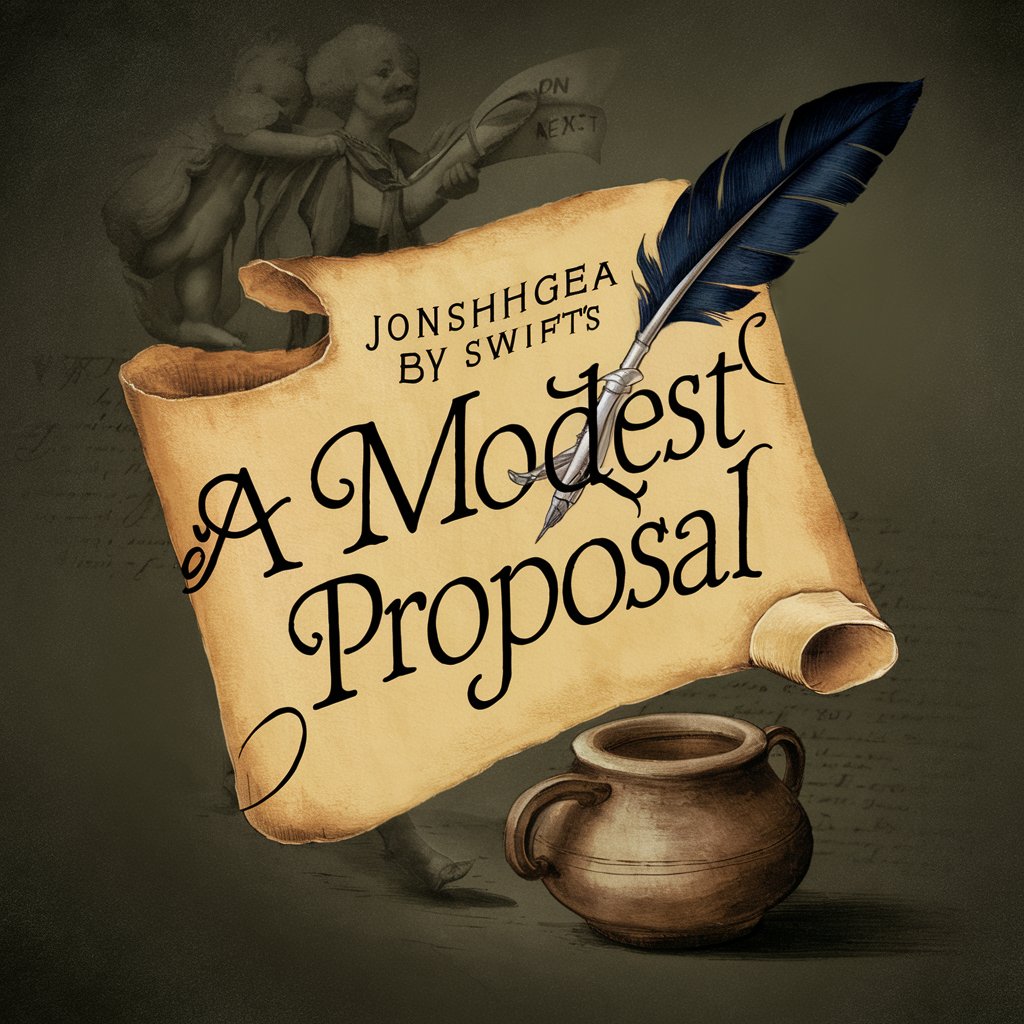
A Modest Proposal by Jonathan Swift - Satire and Social Critique

📚 : Hello, I'm your reading assistant, ready to help with your book journey!
Empowering insight through satire.
📚 : Let's dive into the themes of the text and analyze their significance.
📚 : How can we better understand the author's perspective in this chapter?
📚 : What questions do you have about the characters' motivations?
📚 : Let's explore the historical context to enrich our understanding of the narrative.
Get Embed Code
Introduction to A Modest Proposal
A Modest Proposal by Jonathan Swift is a satirical pamphlet that suggests the impoverished Irish might ease their economic troubles by selling their children as food to rich gentlemen and ladies. Swift's purpose is to shock the reader with an outrageous proposal that aims to highlight the cruel attitudes towards the poor and to criticize the British policy toward Ireland. By suggesting such a grotesque solution, Swift uses irony and sarcasm to bring attention to the real issues of poverty, overpopulation, and the lack of empathy towards the less fortunate in society. An example scenario illustrating Swift's technique is his detailed discussion on how the selling of one-year-old children would not only reduce the population but also provide a new delicacy to the wealthy, thereby solving economic and social problems simultaneously. Powered by ChatGPT-4o。

Main Functions of A Modest Proposal
Social Critique
Example
Swift critiques the heartless attitudes of the wealthy towards the poor by proposing the poor sell their children as food.
Scenario
This function is applied when readers are forced to confront the absurdity of the proposal, leading them to reflect on the underlying social and economic issues in Ireland.
Satirical Commentary
Example
Swift uses satire to exaggerate solutions to Ireland's economic problems, revealing the absurdity of simple fixes to complex issues.
Scenario
In classrooms or literary discussions, this function encourages critical thinking about the effectiveness of political and economic policies and the moral responsibilities of society.
Ideal Users of A Modest Proposal
Educators and Students
This group benefits from Swift's work as a tool for understanding satirical literature, the historical context of 18th-century Ireland, and the use of irony to critique social issues.
Political and Economic Analysts
These users can explore Swift's proposal as an extreme example of policy critique, reflecting on contemporary issues in governance, economic disparity, and social welfare policies.
Literary Enthusiasts
Individuals passionate about literature and satire use Swift's proposal to appreciate the craft of writing and the power of literature as a means to provoke thought and inspire change.

How to Utilize 'A Modest Proposal' by Jonathan Swift
1
Visit yeschat.ai for a free trial without login, also no need for ChatGPT Plus.
2
Read the text carefully to understand Swift's satirical technique, and the socio-political commentary he provides on the conditions of the poor in 18th-century Ireland.
3
Identify key themes such as irony, satire, and the critique of economic policies to analyze how Swift proposes outrageous solutions to highlight the desperate state of the poor.
4
Apply insights from the pamphlet in various analytical contexts, such as essays, discussions, or debates on socio-economic policies, ethical considerations in political discourse, and the use of satire in literature.
5
Reflect on the contemporary relevance of Swift's proposal by comparing it with current socio-economic issues, to foster critical thinking and awareness about poverty, inequality, and the responsibilities of society and government.
Try other advanced and practical GPTs
Dr. Uohna's Comic Tutorials
Learn AI through engaging comics!

Unofficial C.S. Lewis GPT
Exploring Lewis's Legacy with AI

Topical Cluster Master
AI-Powered Insight into Keyword Clusters

Din kropsterapeut
Empowering Wellness with AI-Driven Body Therapy Insights

Ultra-Exhaustive Pathfinder
Maximize your virtual trading profits with AI-powered insights.

Nowy opisowy
Empowering Fashion Narratives with AI

Astro GPT
Unlock the stars, discover yourself

Unity Dev Guru
Empowering game creation with AI

ぽるまる
Empowering your wellness journey with AI

Screenwriter's Companion
Empower Your Storytelling with AI

AI Pal
Your Caring AI Companion, Anytime

Outbound Wizard
Elevating B2B Outreach with AI

Detailed Q&A on 'A Modest Proposal' by Jonathan Swift
What is the main thesis of A Modest Proposal?
The main thesis of 'A Modest Proposal' is a satirical suggestion to solve the problem of poverty in Ireland by selling poor children as food for the wealthy. This outrageous thesis serves as a critique of the British government's neglect of the Irish people and the heartlessness of policies that ignore the plight of the poor.
How does Swift use satire in A Modest Proposal?
Swift uses satire in 'A Modest Proposal' by presenting a grotesque and morally outrageous solution to highlight the severity of poverty in Ireland and the inhumane attitude of the ruling classes. His exaggerated proposal mocks the cold, utilitarian approach to social problems, emphasizing the lack of empathy and ethical consideration in political and economic policies of the time.
What are the socio-political critiques presented in A Modest Proposal?
Swift critiques several socio-political issues in 'A Modest Proposal,' including the brutal exploitation and oppression of the Irish people by the British, the indifference of the Irish landlords, and the ineffective and inhumane economic policies. He highlights the dehumanization of the poor and criticizes the societal and governmental neglect of human dignity and welfare.
Can A Modest Proposal be considered an early example of social justice literature?
Yes, 'A Modest Proposal' can be considered an early example of social justice literature, as it uses satire to draw attention to and criticize the social injustices and economic disparities of Swift's time. It advocates for the recognition of the poor's humanity and the need for compassionate and just policies, making it relevant in discussions on social justice and equity.
How is A Modest Proposal relevant today?
A Modest Proposal remains relevant today as it reflects on issues of poverty, inequality, and governmental responsibility, which are still prevalent in modern society. It encourages critical thinking about how societies treat their most vulnerable members and the importance of ethical considerations in policy-making. Its satirical approach also remains a powerful tool for critiquing contemporary social and political issues.





